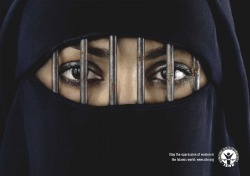Nicolas Sarkozy recently told the French parliment he wants to pass a bill banning the burqa due to its' symbolism of "subservience."
The debate of women's rights in France comes as Europe's modernity wrangles with Islamic women's attire. Modernity is the awareness or idea that existing cultural mores, norms and ideology are discontinuous with the past. In the course of social and cultural revolutions, either by means of advancement, progress, or deterioration, present-day life is vitally altered from earlier periods. Tradition, contrary to modernity, shows how the contemporary replicates the methods, conduct, and actions of the past. France is now at the center of this cultural battle, which some say is necessary for women's rights to advance, while others maintain that banning the burqa is just as unjust as requiring it.
So who's right? As much as I would like to say that women should be able to wear what they want, it's not that simple. Think the opposite side of the spectrum, and ponder why nations have banned nudity in public, even if a religion claims that is the only way "righteous" women present themselves in public. As societies progress, and modernity causes clashes, such problems are called the "crisis of modernity."
The predicament, it would seem, is simply one's sensation of the aspiration of change. It is a common aphorism that humans do not like change. In actuality, the species craves change, as exampled in all phases of world history. Yet, the crisis of modernity can be interpreted as a war on tradition, which is not necessarily so.
Traditions have changed since they began, always adjusting to the culture in which they were incorporated. Therefore, traditions themselves are part of modernity, and a human’s purpose to reinvent or progress what is positive in one’s society for future generations. When purposeless change occurs, described as “postmodernism,” this new dilemma can create even more subjugation.
Modernity does not only entail material items, but also how a society abides by certain adopted morals, or how a government integrates new ideas. Fundamentalism in any religion is the opposite of modernity, which again relies on traditions that do not change with the ethos of culture. If humans were to remain loyal to fundamentalism since societies formed, our species would not have evolved into today’s world.
This can either be looked at in a negative or positive light, but I believe it is for the better that humans can look at traditions and decide that certain changes must be made to progress the present into the future. As a species, we have the ability to look at what we have and what we want, what we are and what we want to become. How we use this intelligence is what separates the connections of past and present, or modernity.
The debate of women's rights in France comes as Europe's modernity wrangles with Islamic women's attire. Modernity is the awareness or idea that existing cultural mores, norms and ideology are discontinuous with the past. In the course of social and cultural revolutions, either by means of advancement, progress, or deterioration, present-day life is vitally altered from earlier periods. Tradition, contrary to modernity, shows how the contemporary replicates the methods, conduct, and actions of the past. France is now at the center of this cultural battle, which some say is necessary for women's rights to advance, while others maintain that banning the burqa is just as unjust as requiring it.
So who's right? As much as I would like to say that women should be able to wear what they want, it's not that simple. Think the opposite side of the spectrum, and ponder why nations have banned nudity in public, even if a religion claims that is the only way "righteous" women present themselves in public. As societies progress, and modernity causes clashes, such problems are called the "crisis of modernity."
The predicament, it would seem, is simply one's sensation of the aspiration of change. It is a common aphorism that humans do not like change. In actuality, the species craves change, as exampled in all phases of world history. Yet, the crisis of modernity can be interpreted as a war on tradition, which is not necessarily so.
Traditions have changed since they began, always adjusting to the culture in which they were incorporated. Therefore, traditions themselves are part of modernity, and a human’s purpose to reinvent or progress what is positive in one’s society for future generations. When purposeless change occurs, described as “postmodernism,” this new dilemma can create even more subjugation.
Modernity does not only entail material items, but also how a society abides by certain adopted morals, or how a government integrates new ideas. Fundamentalism in any religion is the opposite of modernity, which again relies on traditions that do not change with the ethos of culture. If humans were to remain loyal to fundamentalism since societies formed, our species would not have evolved into today’s world.
This can either be looked at in a negative or positive light, but I believe it is for the better that humans can look at traditions and decide that certain changes must be made to progress the present into the future. As a species, we have the ability to look at what we have and what we want, what we are and what we want to become. How we use this intelligence is what separates the connections of past and present, or modernity.

 RSS Feed
RSS Feed





